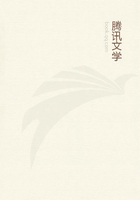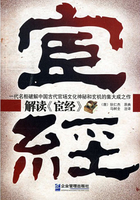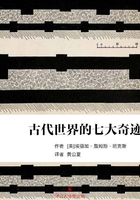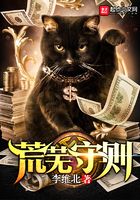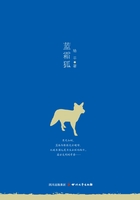Carlier came back on the verandah. "They're all gone, hey?" asked Kayerts from the far end of the common room in a muffled voice. "You did not find anybody?""Oh, yes," said Carlier, "I found one of Gobila's people lying dead before the huts--shot through the body. We heard that shot last night."Kayerts came out quickly. He found his companion staring grimly over the yard at the tusks, away by the store. They both sat in silence for a while. Then Kayerts related his conversation with Makola. Carlier said nothing. At the midday meal they ate very little. They hardly exchanged a word that day. A great silence seemed to lie heavily over the station and press on their lips. Makola did not open the store; he spent the day playing with his children. He lay full-length on a mat outside his door, and the youngsters sat on his chest and clambered all over him. It was a touching picture. Mrs. Makola was busy cooking all day, as usual. The white men made a somewhat better meal in the evening. Afterwards, Carlier smoking his pipe strolled over to the store; he stood for a long time over the tusks, touched one or two with his foot, even tried to lift the largest one by its small end. He came back to his chief, who had not stirred from the verandah, threw himself in the chair and said--"I can see it! They were pounced upon while they slept heavily after drinking all that palm wine you've allowed Makola to give them. Aput-up job! See? The worst is, some of Gobila's people were there, and got carried off too, no doubt. The least drunk woke up, and got shot for his sobriety. This is a funny country. What will you do now?""We can't touch it, of course," said Kayerts.
"Of course not," assented Carlier.
"Slavery is an awful thing," stammered out Kayerts in an unsteady voice.
"Frightful--the sufferings," grunted Carlier with conviction.
They believed their words. Everybody shows a respectful deference to certain sounds that he and his fellows can make. But about feelings people really know nothing. We talk with indignation or enthusiasm; we talk about oppression, cruelty, crime, devotion, self-sacrifice, virtue, and we know nothing real beyond the words. Nobody knows what suffering or sacrifice mean--except, perhaps the victims of the mysterious purpose of these illusions.
Next morning they saw Makola very busy setting up in the yard the big scales used for weighing ivory. By and by Carlier said: "What's that filthy scoundrel up to?" and lounged out into the yard. Kayerts followed. They stood watching. Makola took no notice. When the balance was swung true, he tried to lift a tusk into the scale. It was too heavy. He looked up helplessly without a word, and for a minute they stood round that balance as mute and still as three statues. Suddenly Carlier said: "Catch hold of the other end, Makola--you beast!" and together they swung the tusk up. Kayerts trembled in every limb. He muttered, "I say! O! I say!" and putting his hand in his pocket found there a dirty bit of paper and the stump of a pencil. He turned his back on the others, as if about to do something tricky, and noted stealthily the weights which Carlier shouted out to him with unnecessary loudness. When all was over Makola whispered to himself:
"The sun's very strong here for the tusks." Carlier said to Kayerts in a careless tone: "I say, chief, I might just as well give him a lift with this lot into the store."As they were going back to the house Kayerts observed with a sigh:
"It had to be done." And Carlier said: "It's deplorable, but, the men being Company's men the ivory is Company's ivory. We must look after it." "I will report to the Director, of course," said Kayerts. "Of course; let him decide," approved Carlier.
At midday they made a hearty meal. Kayerts sighed from time to time.
Whenever they mentioned Makola's name they always added to it an opprobrious epithet. It eased their conscience. Makola gave himself a half-holiday, and bathed his children in the river. No one from Gobila's villages came near the station that day. No one came the next day, and the next, nor for a whole week. Gobila's people might have been dead and buried for any sign of life they gave. But they were only mourning for those they had lost by the witchcraft of white men, who had brought wicked people into their country. The wicked people were gone, but fear remained. Fear always remains. A man may destroy everything within himself, love and hate and belief, and even doubt;but as long as he clings to life he cannot destroy fear: the fear, subtle, indestructible, and terrible, that pervades his being; that tinges his thoughts; that lurks in his heart; that watches on his lips the struggle of his last breath. In his fear, the mild old Gobila offered extra human sacrifices to all the Evil Spirits that had taken possession of his white friends. His heart was heavy. Some warriors spoke about burning and killing, but the cautious old savage dissuaded them. Who could foresee the woe those mysterious creatures, if irritated, might bring? They should be left alone. Perhaps in time they would disappear into the earth as the first one had disappeared.
His people must keep away from them, and hope for the best.
Kayerts and Carlier did not disappear, but remained above on this earth, that, somehow, they fancied had become bigger and very empty.
It was not the absolute and dumb solitude of the post that impressed them so much as an inarticulate feeling that something from within them was gone, something that worked for their safety, and had kept the wilderness from interfering with their hearts. The images of home;the memory of people like them, of men that thought and felt as they used to think and feel, receded into distances made indistinct by the glare of unclouded sunshine. And out of the great silence of the surrounding wilderness, its very hopelessness and savagery seemed to approach them nearer, to draw them gently, to look upon them, to envelop them with a solicitude irresistible, familiar, and disgusting.




